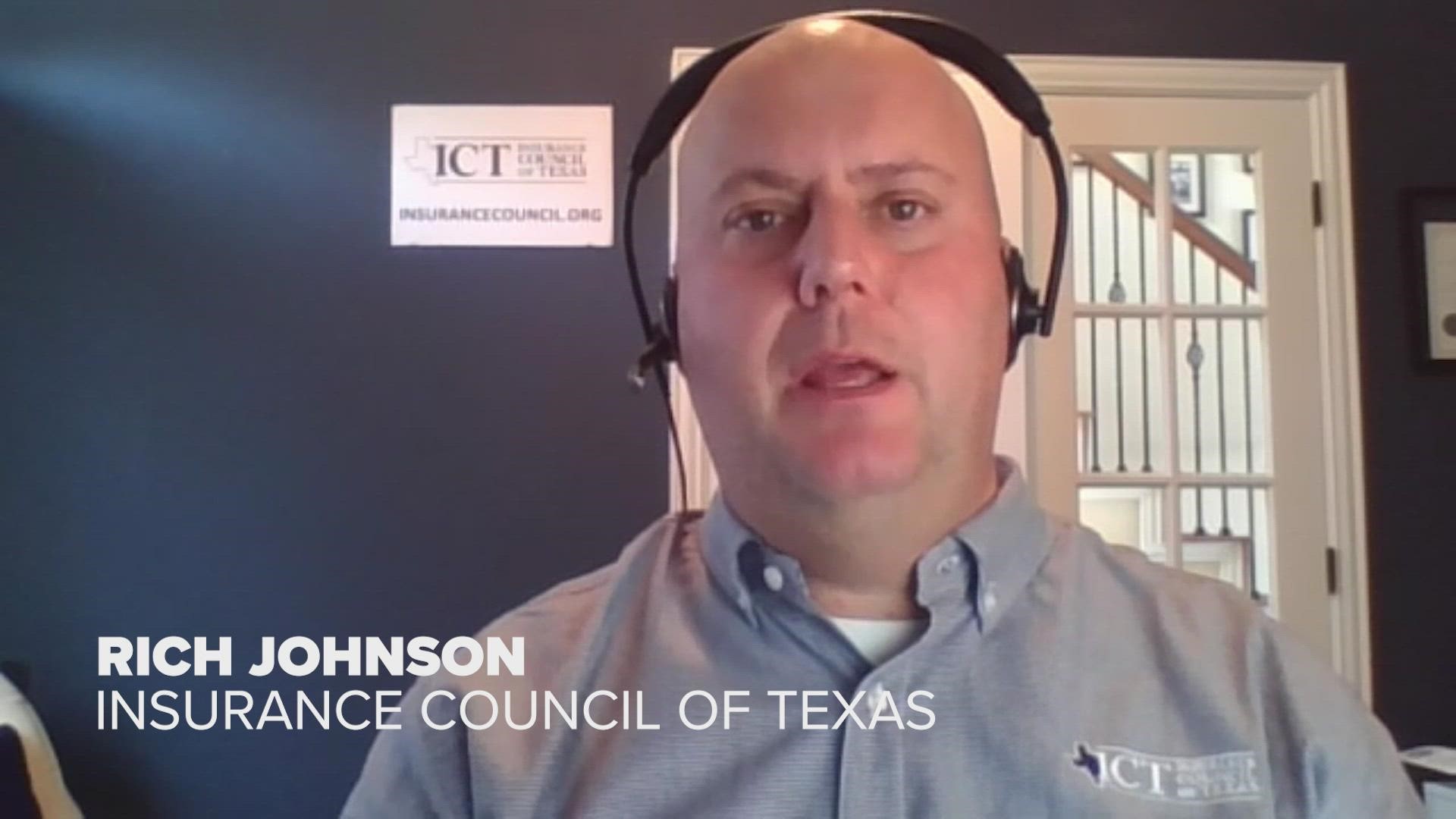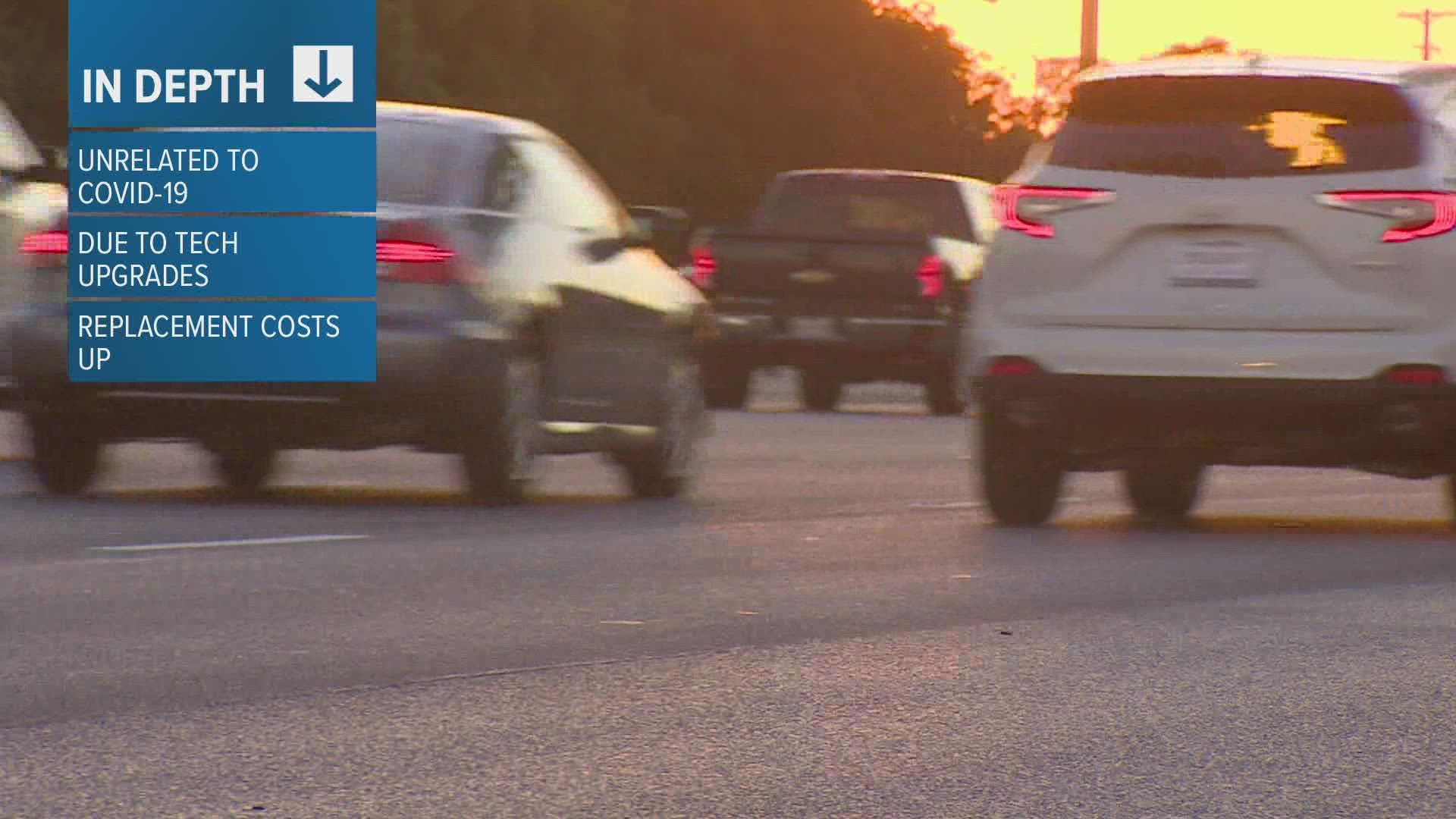TEXAS, USA — Many drivers across the country will likely see an increase in how much they are paying for car insurance in 2022, according to a national insurance research company.
For many Texans, though, this rise might not be as drastic as it will be in other parts of the country.
Auto insurance rates are expected to rise by about 0.6% this year, according to a recent ValuePenguin study. These rates fell in 2021.
The average cost for fully-covered auto insurance in the U.S. is currently $1,935 a year.
While 22 states will see an increase of 1% or greater in 2022, Texas is one of 14 that will see a decrease. In fact, Texas has the second-lowest average auto rate in the United States at $1,094, according to ValuePenguin. Maine has the lowest average at $1,051 while Michigan has the highest at $7,161.
However, when it comes to the cost of a traffic violation, ticket or accident, Texas has the largest percent increase in the country from last year to this year in auto insurance, ValuePenguin says. That average premium increase is 142%. North Carolina is the second highest at 127%.
What factors impact car insurance rates?
There are many reasons why insurance rates are different from driver to driver beyond simply how many accidents and tickets someone has received as well as someone's driving record.
The way people drive on the roads where you live, as well as the frequency of wrecks can impact your potential premiums, according to Rich Johnson. He is the communications director for The Insurance Council of Texas.
"Are there all of a sudden an uptick in accidents in your area?" Johnson posed. "We're looking to the future and saying, 'Ok, in this area, there are a lot of people that are speeding. There are a lot of people getting in accidents. The frequency and severity are increasing.' All of those factors go into pricing auto insurance."
Certain parts of the country have a higher likelihood for more severe weather that could cause major damage to vehicles. This can also influence insurance companies to make their pricing different depending on what area of the country you live or work in.
"We like to look at insurance as a team sport," Johnson described. "It writes risk. Not only to the individual risk but what's going on in the area."
Why the increase?
The expected rise in auto insurance prices across the country is not heavily impacted by COVID-19 and is something that has been expected for 5-6 years, according to Johnson.
Johnson said the technology that has progressively been added to cars in the last 10-15 years is starting to have an impact on auto insurance. Whether it be advancements such as backup cameras, radars or sensors, when these higher-end materials start to become more prevalent on the road, this creates an increase in cost to repair these cars and replace their parts. That then forces many insurance companies to adjust their premiums.
"If we think about our car from, say, the year 2000 or even 2005, we have plastic bumpers," Johnson said. "We had aluminum bumpers. We had headlights that maybe cost $100 to replace. Whereas now, headlights could be as much as $1,000. The cost of windshields is going up. All of those factors come into play. So the cost to repair cars today as opposed to 5, 10, or 15 years ago is going up."
The expected rise also factors in that many insurance companies expect more people to be on the road this year which will lead to more accidents, according to ValuePenguin. This will then also lead to more claims and higher premiums.
A continued increase in distracted driving and supply chain shortages will also contribute to rising premiums, ValuePenguin says.
Even with the expected rise in 2022, the current national rates are below pre-pandemic levels, according to ValuePenguin insurance spokesperson Divya Sangam.
"Prior to 2020, we saw premiums increase anywhere from 5 to 6% respectively," Sangam said. "In fact, rates increased every year from 2011 to 2020. While insurers may not be giving out COVID discounts, there are still ways to save. 76% of Americans who shopped around for insurance say they saved hundreds of dollars doing so."
What makes car insurance in Texas unique?
According to Texas law, every driver in the state is required to have proof of auto insurance.
Texas also has a "Consumer Bill of Rights" for auto insurance that explains rights for both drivers and companies.
There are eight main types of auto insurance coverage:
- Liability coverage
- Collision coverage
- Comprehensive coverage
- Medical payments coverage
- Personal injury protection coverage
- Uninsured/underinsured motorist coverage
- Towing and labor coverage
- Rental reimbursement coverage
Because of the size of Texas and the range of weather that can impact different parts of the state, very few places in the U.S. have a need for such a diversity of coverage, according to Johnson.
"If you look at Texas, we have hurricanes, we have flooding, we have hail and we have tornadoes," Johnson listed. "It's kind of a melting pot of natural disasters compared to much of the other parts of the country that may only have winter storms or specific types of storms."
How you can save money
One of the best ways to save money when it comes to your auto insurance is to look at other potential offers when your current plan is about to expire, Johnson said.
"The biggest thing is shop around," Johnson said. "Even if you're not buying a new car, if it's just the new year, it's a good time to look at your policy and make sure you know what's in it. Go ahead and contact your insurance company or other insurance companies, see if you can get a better rate."
Johnson said that how many cars you have and the value of your care should play a factor in your decision process. If you have an older car or one you aren't planning to own for a long time, full coverage might not be necessary.
The website helpinsure.com also compares policies specifically in Texas, including the country's top 25 insurance groups. It can provide policies sold in your area, a company's rates and different coverage types.
Johnson said some other ways to potentially save money on your auto insurance include:
- driving less annually
- affiliation discounts
- college alumni association discounts
- taking a defensive driving court
- providing report cards for children with good grades
"You can always contact your insurance company and tell them, 'Hey, I'm not driving 20,000 miles a year anymore because I'm not commuting,' Johnson said. "'I'm staying at home. My car's garaged.' All of those factors could also come into play."
Johnson said it falls on the customers' shoulders to be proactive in seeing if insurance companies will provide discounts or deals based on certain connections or reports.


